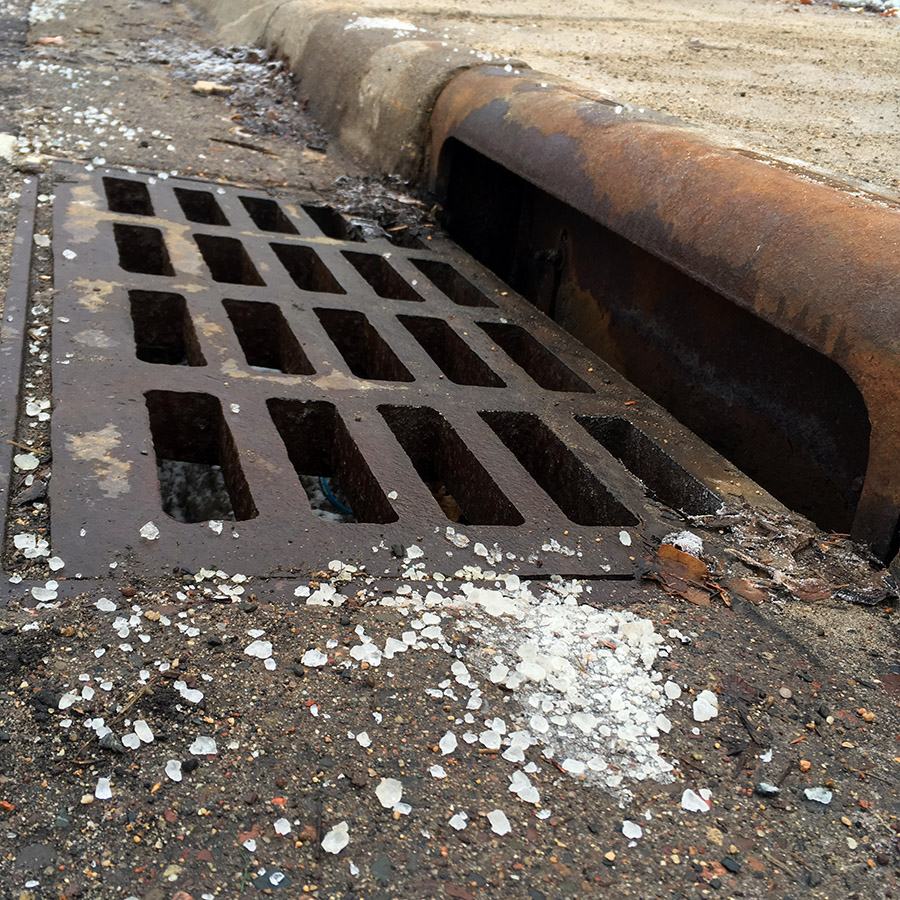
A solution for salt?
How a new law could reduce chloride pollution in Minnesota
by Chris O’Brien, communications coordinator

Spring is here, and while ice and snow may soon be a memory, the salt applied to Minnesota roads, parking lots and walkways persists. Meltwater carries salt down through the soil, and also to storm drains that empty into lakes and streams.
Surface water and groundwater contamination from chloride (salt and related chemicals) poses long-term ecological and health risks. Too much chloride can make waters unsuitable for fish and aquatic plants, and cities such as Madison have reported chloride contamination in drinking water. This month, a new law aimed at curbing salt use has garnered support in the Minnesota Legislature.
Liability legislation
The proposed legislation is intended to encourage private salt applicators to take salt application training by offering them limited liability protection from ice-related injury and property damage. The Minnesota Pollution Control Agency (MPCA) has offered this training for the past decade, but about 80 percent of participants have been municipalities – not private contractors.
In many cases, private contractors use far more salt than is necessary on parking lots and walkways in order to avoid being sued.
The House bill (H.F. 3577) was heard March 14 by the Environment and Natural Resources Policy and Finance Committee. The bill was then referred to the Civil Law and Data Practices Policy Committee, which passed the bill and made adjustments to the liability language. The bill was then referred back to the previous House committee, chaired by Rep. Dan Fabian.
There is also a Senate bill (S.F. 3199) on salt application, which passed the Environment and Natural Resources Policy and Legacy Finance Committee on March 21. It now heads to the Senate Judiciary and Public Safety Finance and Policy Committee for further review.
A matter of funding
Currently, the MPCA salt application training is funded by the U.S. Environmental Protection Agency (EPA) 319 Grant Program. This funding source has at least two main drawbacks:
- Grant application is a competitive process, and there is no guarantee Minnesota will receive a new 319 Grant when current funds expire in August 2019.
- The 319 funds must be used in watersheds that have a chloride impairment, rather than allowing preventative training in areas of the state that are not yet impaired.
If a new sustainable funding source is not identified, MPCA salt application training could end – not only for private contractors, but for city and county staff as well.
Connie Fortin of Fortin Consulting works with the MPCA to provide the training, and she has found that many cities have reduced their salt use by 30 to 50 percent after making simple adjustments to their equipment and practices. “The City of Richfield made changes that were not expensive, and they were able to see a 50 percent reduction in about two years,” explained Fortin.
Next steps for salt
Among watershed professionals, the rise in public concern over chloride pollution in Minnesota is a welcome trend. Multiple reports by local media outlets, along with outreach by Master Water Stewards in cooperation with the Freshwater Society, have helped bring the issue to the forefront.
Sue Nissen is a Master Water Steward who helped launch the group Stop-Over-Salting, a coalition of salt applicators, business, cities, watershed districts, nonprofit organizations and citizens. She has testified at the Minnesota House and Senate hearings. “I think this legislation is raising awareness. Many people have not realized the permanency of chloride pollution,” Nissen said. “We found that education alone was not enough to change the practices of commercial applicators.”
Still, training and liability protection for salt applicators is only part of the solution. Technology may soon offer new types of pavement that don’t require salt for safety, and these infrastructure improvements will require additional support from the public and Legislature.
“There’s a lot of innovation in this area, but we never use it because we don’t have to,” said Fortin. “We just put salt on everything.”
Note: A Smart Salting Level II training workshop will be offered April 11 at 8 a.m. in Shoreview. To register, contact Sage Passi.
Questions or comments? Join the conversation on our Facebook page, or drop us an email.